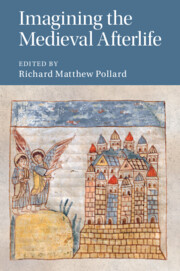Book contents
- Imagining the Medieval Afterlife
- Cambridge Studies in Medieval Literature
- Imagining the Medieval Afterlife
- Copyright page
- Contents
- Figures
- Contributors
- Preface and Acknowledgements
- Abbreviations
- Imagining the Medieval Afterlife: Introduction
- Part I Chronological Surveys
- Chapter 1 Just Deserts in the Ancient Pagan Afterlife
- Chapter 2 Visions of the Afterlife in the Early Medieval West
- Chapter 3 A Morbid Efflorescence: Envisaging the Afterlife in the Carolingian Period
- Chapter 4 The Afterlife in the Medieval Celtic-Speaking World
- Chapter 5 Anglo-Saxon Visions of Heaven and Hell
- Chapter 6 Otherworld Journeys of the Central Middle Ages
- Chapter 7 Visions of the Otherworlds in the Late Middle Ages, c. 1300–c. 1500
- Part II Theological Perspectives
- Part III Artistic Impressions
- Part IV Notable Authors and Texts
- Bibliography
- Index
- Cambridge Studies in Medieval Literature
Chapter 2 - Visions of the Afterlife in the Early Medieval West
from Part I - Chronological Surveys
Published online by Cambridge University Press: 07 December 2020
- Imagining the Medieval Afterlife
- Cambridge Studies in Medieval Literature
- Imagining the Medieval Afterlife
- Copyright page
- Contents
- Figures
- Contributors
- Preface and Acknowledgements
- Abbreviations
- Imagining the Medieval Afterlife: Introduction
- Part I Chronological Surveys
- Chapter 1 Just Deserts in the Ancient Pagan Afterlife
- Chapter 2 Visions of the Afterlife in the Early Medieval West
- Chapter 3 A Morbid Efflorescence: Envisaging the Afterlife in the Carolingian Period
- Chapter 4 The Afterlife in the Medieval Celtic-Speaking World
- Chapter 5 Anglo-Saxon Visions of Heaven and Hell
- Chapter 6 Otherworld Journeys of the Central Middle Ages
- Chapter 7 Visions of the Otherworlds in the Late Middle Ages, c. 1300–c. 1500
- Part II Theological Perspectives
- Part III Artistic Impressions
- Part IV Notable Authors and Texts
- Bibliography
- Index
- Cambridge Studies in Medieval Literature
Summary
From the sixth century onwards, numerous visions of the afterlife and the otherworld were recorded by authors who operated in the post-Roman barbarian West. The most prevailing characteristics of all these accounts are their brevity and conciseness. More often than not, these stories were integrated into a larger historical or hagiographic narrative, in an attempt to stress various political, religious, or cultural points. It was only towards the end of the Merovingian period, with the composition of the so-called Visio Baronti, that more comprehensive accounts of the afterlife began to appear in the West, and thus paved the way for the emergence of a new literary genre. This chapter discusses the evolution of these narratives, as well as the various possible reasons why travels to the otherworld became a seminal component in the historiographical and hagiographical tradition of the early medieval West.
Keywords
- Type
- Chapter
- Information
- Imagining the Medieval Afterlife , pp. 25 - 39Publisher: Cambridge University PressPrint publication year: 2020

